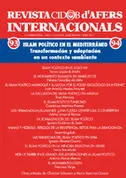The paradoxes of political Islam in Syria

The aim of this article is to analyse the evolution of political Islam in Syria since Bashar al-Asad became president. Over the past 10 years, a horizontal Islamisation has taken place that has called into question Syria’s image as a containing wall against Islamism. Aware of its inability to oppose a phenomenon that affects the Arab world as a whole, the Bashar regime has opted for a bestowed Islamisation, by sponsoring various Sufi brotherhoods with the aim of reducing as much as possible the country’s exposure to the jihadist phenomenon. However, the country’s laxity as regards the infiltration of insurgents into Iraqi territory by crossing Syrian borders has ended up taking its toll on the regime, as has been shown by the violent emergence of factions such as Yund al-Sham and Fatah al-Islam. Meanwhile, the illegality of the Muslim Brotherhood has been maintained, though at the same time direct contact has been made with them which has led to the freeing of hundreds of political prisoners and the return of dozens of exiles.
Key words: Syria, Bashar al-Asad, Islamism, Muslim Brotherhood, Sufism
The full text articles of this issue are available only in Spanish language